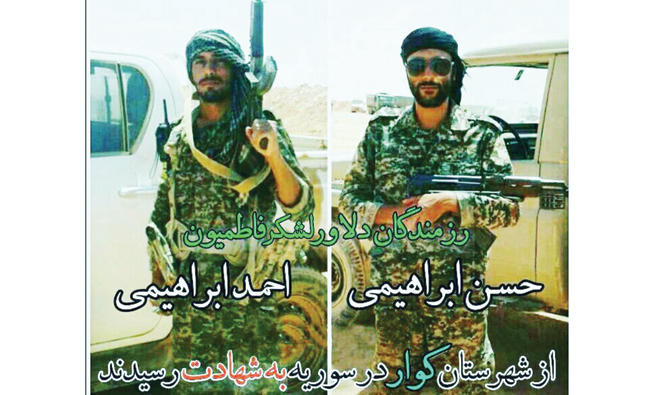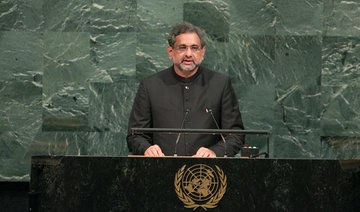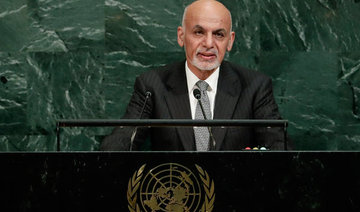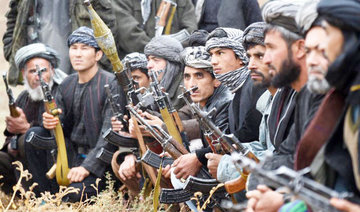KABUL: An Afghan soldier who is killed in action gets barely enough compensation to cover the funeral expense. A wounded soldier receives far less.
But the package Iran offers Afghans to fight in Syria is far more attractive: Permanent residency for the deceased’s family, accommodation and several years of monetary support for the household. A wounded Afghan mercenary receives more or less the same.
This attracts desperate and jobless Afghan refugees in Iran, as well as many in Afghanistan, to fight in support of the Syrian regime.
The main source of recruitment in Afghanistan is the peaceful yet impoverished parts of the central highlands with a predominantly Shiite population.
Some 700,000 Afghans reportedly live illegally in Iran, besides nearly a million registered refugees. This collectively provides Tehran with a breeding ground for recruitment.
Abdul Hameed, 19-year-old school graduate from Afghanistan’s Bamiyan province, fought in Syria.
Jobless and frustrated at home, he went to Iran in 2012 aged 14 and managed to get a job. But after working for a year as a laborer, he became jobless again and his savings ran out.
The war in Syria was at its peak in 2014, and a group of Afghans serving Iran’s government gave him an offer to go to Syria, which he accepted without hesitation.
“The proposal was approximately $300 a month, permanent residency in Iran and other concessions depending on whether I’d die, get injured or return safe,” Hameed told Arab News.
“We were sent by plane from Iran to Syria and settled in Aleppo. The process of recruitment isn’t compulsory. Iran doesn’t force you to go to Syria.”
In Aleppo, Hameed met fighters from other Muslim countries such as Pakistan, Iraq and Lebanon. Separate camps were designated for each country, he said.
“The Afghans were called Fatemiyun, the Pakistanis were named Zainebiyun, and the Iraqis were called Haidaris. There were 12 Iranian commanders who provided training or gave commands.”
Before joining the battlefield, the recruits undergo training involving small and heavy weaponry, as well as land mines, said Hameed.
That would be followed by a short trip to Iran, then back to Syria to face groups such as Al-Qaeda and Daesh.
“They’re beheading people and destroying our (Shiite) mosques and holy places. I’ve seen it with my own eyes,” Hameed said. Fighters from Pakistan travel overland to Iran and are then flown to Syria, he added.
Hameed’s time in Syria came to an end when one night, a large number of Afghan fighters came under sudden attack from militants.
“There was a massive attack against us. We couldn’t resist. Some 200 Afghans died that night alone,” he said.
“Me and 30 others were injured and taken to hospital in Syria, then transferred to a hospital in Iran for a month.”
After his recovery Hameed stayed in Iran for three months, but then returned home to his family, who were completely unaware of his trip to Syria.
“I was given a 10-year residency permit in Iran, but I declined it and returned home last year,” he said. Hameed has a baby now, but is jobless again.
An Afghan government official, speaking on condition of anonymity because he is not authorized to speak to the media, told Arab News: “This is a highly sensitive issue. If the government give figures and comments, Daesh will turn its attention toward Afghanistan, viewing it as the ground from where Shiites go to Syria to fight them.”
Daesh’s affiliates in Afghanistan have frequently targeted Shiite congregations and mosques in recent years.
There is no public record of when Iran began recruiting Afghans or how many have been recruited.
But Waheed Mozhad, an Afghan analyst and writer, said the number of fighters who have gone back and forth is around 10,000, and recruitment began in 2013.
Safora, a female lawmaker from Bamiyan, said some Shiite clergy in Afghanistan have aided recruitment.
“Poverty and desolation have forced people from central areas of Afghanistan to go to Syria,” she told Arab News.
“We’re totally against it, but people need food and other necessities for their families, so they go for it,” she said.
“I know people from different provinces who lost their sons in the war in Syria. I know some families who went to Iran, to get a house and other concessions promised by Tehran, after they lost a family member in Syria,” she added.
“Unfortunately, the Afghan government has done nothing to stop this recruitment or confront Tehran over the issue.”
Poverty, religious fervor push Afghans to join Iran’s war in Syria
Poverty, religious fervor push Afghans to join Iran’s war in Syria
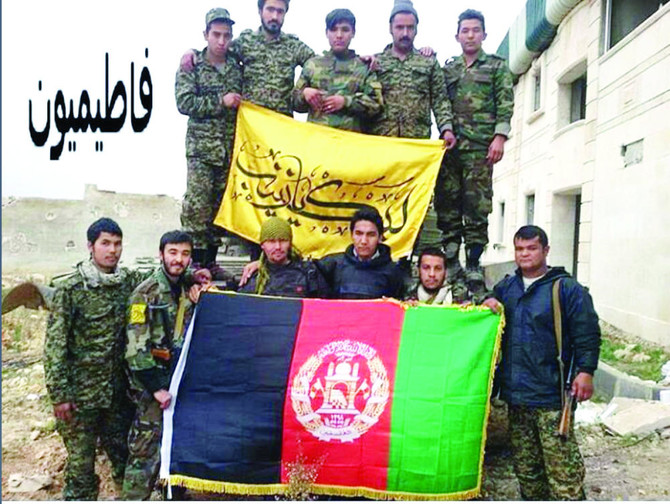
Why Israel’s Gaza reoccupation threat is fueling fears of regional spillover

- Analysts warn of slide toward ethnic cleansing as Israel signals plans for indefinite military control over enclave
- Palestinian plight worsens as far-right voices increasingly influence Israeli war aims ahead of Trump’s Gulf tour
LONDON: For the people of Gaza, the threat of destruction, displacement and death at the hands of the Israeli military is nothing new.
But for the next week they will living with a countdown to a threatened operation that would be unprecedented: the complete and indefinite occupation of Gaza by Israel, and the forcing of its Palestinian population into a tiny area in the south of the strip.
If such an unthinkable end-game exercise were to go ahead — and reports that tens of thousands of Israeli reservists are being called up suggests it might — critics of the plan say Israel appears to have forgotten the lessons of the events that led to its own creation in 1948.
According to sources inside the Israeli government, the only thing standing between the Palestinians of Gaza and this 21st-century Nakba is next week’s visit to the region by US President Donald Trump, who is due to visit Saudi Arabia, Qatar and the UAE between Tuesday and Friday.

On Tuesday this week an unnamed Israeli defense official told AP that the operation would not be launched before Trump had left the region, adding there was a “window of opportunity” for a ceasefire and a hostage deal during the president’s visit.
And so, the countdown to the military operation began. On Monday, Israeli Prime Minister Benjamin Netanyahu said his security cabinet had approved an “intensive” renewed offensive against Hamas in Gaza, and that Palestinians would be moved “for their own safety.”
“Last night we stayed up late in the cabinet and decided on an intensive operation in Gaza,” Netanyahu said.
A US-backed truce between Israel and Hamas ended in March, after only two months, when Israel resumed its attacks.
It was, Netanyahu added, seeming to tether a scapegoat to the decision, “the chief of staff’s recommendation to proceed, as he put it, toward the defeat of Hamas — and along the way, he believes this will also help us rescue the hostages.”
News of the plan triggered immediate protests outside Israel’s parliament by families of the Israeli hostages still held by Hamas. Few among them believe the plan has anything to do with a genuine desire to see their loved ones freed.

The chief of the general staff of the Israel Defense Forces is retired Major-General Eyal Zamir, a favorite of the far-right members of Israel’s government, who was appointed only last month. His predecessor resigned, after taking responsibility for Israel’s military failings during the Hamas attack in October 2023.
“I’m pretty sure Zamir is praying that he will not have to execute this plan,” Ahron Bregman, a UK-based Israeli historian and senior teaching fellow at the Department of War Studies, King’s College London, and a former IDF officer, told Arab News. “He’s experienced enough to know that the operation might well kill the remaining Israeli hostages, or lead to a situation where the hostages are left to die in the tunnels without water or food, never to be found.
“As I have always maintained, Israel cannot destroy Hamas. Hamas, weak, bleeding and exhausted, will still be in the Gaza Strip when this hopeless war is over,” he added.
Israeli troops, who have evicted Palestinians from so-called security zones, already occupy about one-third of Gaza. If implemented, the new plan would see the seizure of the entire territory, with Gaza’s remaining two million Palestinians forced toward the south.
The UN has already expressed alarm at Israel’s plan to expand its operation in Gaza. “This will inevitably lead to countless more civilians killed and the further destruction of Gaza,” UN deputy spokesperson Farhan Haq said on Monday. “What’s imperative now is an end to the violence, not more civilian deaths and destruction.”
He added: “Gaza is, and must remain, an integral part of a future Palestinian state.”
Meanwhile, Netanyahu’s security cabinet has voted to end distribution of aid by international NGOs and UN bodies, and to give the job to as-yet unnamed private companies. At the beginning of the month, the UN condemned Israel’s decision two months ago to halt humanitarian aid as a “cruel collective punishment” of the Palestinian population.
On Friday, Mike Huckabee, US ambassador to Israel, said a US-backed mechanism for distributing aid into Gaza should take effect soon but he gave few details. Israel and the US have both indicated in recent days that they were preparing to restore aid through mechanisms that would bypass Hamas.
“The Israeli military plan for Gaza is mainly aimed at satisfying the far-right elements in Netanyahu’s government,” said Bregman. “The new idea here is seizing chunks of the Gaza Strip and staying there, not getting out, as used to be the case.”
Right-wing, pro-settler members of the Israeli Cabinet, including Finance Minister Bezalel Smotrich and National Security Minister Itamar Ben-Givr, “hope that staying inside will eventually lead to the resettling of the Gaza Strip by Jewish settlers who will resort to the tactics they employ on the West Bank, building settlements even if ‘official Israel’ opposes it,” he added. “They also trust far-right elements in the IDF — and the IDF is packed with them, especially in the ground forces — to turn a blind eye and enable the resettling of the Strip.”
But, he warned, “if ordered to implement the Gaza plan, Israeli troops must refuse to carry out the orders, lest they turn themselves into war criminals.”
On Tuesday, the day after Netanyahu’s announcement, Smotrich told a settlements conference in the West Bank that Gaza would soon be “totally destroyed,” and that its entire population would be “concentrated” in a narrow strip of land along the Egyptian border, which he euphemistically described as a “humanitarian zone.”
Here, he added, ”they will be totally despairing, understanding that there is no hope and nothing to look for in Gaza, and will be looking for relocation to begin a new life in other places.”
Sir John Jenkins, former UK ambassador to Saudi Arabia, Iraq and Syria, and British consul-general in Jerusalem, told Arab News: “There are clearly elements within the Israeli Cabinet who want to reoccupy some or even all of Gaza and there are others who want to establish settlements. What is unclear is how extensive or long-term such plans are — and whether they have Netanyahu’s full support.
“He has clearly got his own tactical reasons for going along with some of the wilder claims: he needs to keep Smotrich and Ben Gvir inside the tent in order to maintain his government. He also probably genuinely believes — as, quite rightly, do most Israelis and a lot of outsiders — that Hamas cannot be allowed to retain political control of Gaza when the fighting stops.
“But he must also know that without a long-term political plan, this won’t work. Israel needs its neighbors to support it in its quest for security. And they will do so only if they have an answer to the question: How do we collectively make Israeli security compatible with Palestinian self-determination?”
Burcu Ozcelik, senior research fellow for Middle East security at the Royal United Services Institute, said it remains unclear whether Israel’s threat of reoccupation is “a form of deterrence, a credible threat, or a last-ditch effort to (force) Hamas’ hand.”
However, “the fear of abandoning the Israeli hostages to a terrible fate is too much to bear for the majority of the Israeli polity, and this would inevitably have consequences for the current Israeli government,” he told Arab News.
President Trump’s upcoming visit may also change the script. “It is rumored that Trump is not on board with Israel’s escalation of the war in Gaza, especially ahead of his visit to the Gulf next week,” said Ozcelik. “The White House has been pressing for a deal to announce as a triumph and a hostage-release announcement would be a crucial win for (US special envoy to the Middle East) Steve Witkoff, but so far it has been elusive.”
Furthermore, “under the threat of a looming ‘forever’ Israeli reoccupation of Gaza, Saudi Arabia cannot be expected to agree to any deal with the US that is conditional on normalization with Israel. So, this, in a counterintuitive way, throws open a path for US-Saudi security cooperation,” Ozcelik added.
Doubts also surround the announcement by Witkoff that the US will set up a private foundation to deliver aid to Gaza, without involving the IDF or the US government.
“The UN and key international humanitarian agencies have already rejected both the US and Israeli aid proposals, labelling them highly unworkable,” Kelly Petillo, program manager, MENA, at the European Council on Foreign Relations, told Arab News.
“And in the context of Israel’s campaign of starvation by stopping humanitarian aid since March and the targeting of civilians, hospitals, schools and so on, and of the new US administration’s rhetoric around the Gaza war and overall positioning, there are clearly doubts over the lack of good will by the delivering authorities, which means that Palestinians will be starved and eventually be forced to leave.
“This would amount to ethnic cleansing and also corresponds to weaponizing aid and using starvation as a weapon of war. It will mean that considerations over how many people will receive aid, or where distribution will occur, would be based on strategic or military considerations, rather than humanitarian ones.”
Israel’s apparent ambition to force Palestinians out of Gaza can only further stoke regional tensions, added Petillo.
“Regional actors, (most) of all Egypt and Jordan, have been very clear in their total rejection of any displacement of Palestinians from Gaza, and of the possibility of them receiving these refugees. In particular, Egypt has come up with a proposal to address aid and other issues as a way to counter this scenario.
“But the potential displacement of Palestinians in Gaza is nothing less than an existential threat for these countries which are also receiving so many other refugees — from Syria to Sudan and more. Syria and Lebanon have also been floated as possible destinations for Gazans, but this would be a major red line for these countries too.”
Echoing Petillo’s concerns, Sanam Vakil, director of the Middle East North Africa Program at Chatham House, the Royal Institute of International Affairs, said the Israeli plan to capture and indefinitely occupy Gaza “carries grave policy implications at multiple layers and levels for Israel, Palestinians and the region.”
Vakil said: “Beyond deepening an already catastrophic humanitarian crisis, it risks entrenching violent resistance, destabilizing neighboring states and triggering large-scale displacement that may be viewed internationally as ethnic cleansing — particularly in light of right-wing Israeli rhetoric and emboldening signals from past US policies.
“While Israel consistently sees Gaza as an existential security crisis that needs a military solution, it needs to take a step back and consider the larger and longer implications for its isolation, integration and values as a democracy,” she added. “Today, Arab states are watching Israel’s response in a fearful rather than (admiring) way.”
Caroline Rose, director of the Strategic Blind Spots Portfolio at the Washington think-tank New Lines Institute, said the expansion in Israel’s war plan for the Gaza Strip “signals Netanyahu’s imperative to continue the conflict as a mechanism of political survival, despite the strain on Israel’s economy, IDF personnel and reserves, and reduced chances for a hostage agreement.”
She told Arab News: “It’s likely also that Netanyahu and his cabinet are seeking to expand operations as a negotiation tool with the US and its regional counterparts, particularly following disappointment with the US for exploring negotiation opportunities with Iran over their nuclear program.”
But “by design, this war plan will have serious implications for the civilian population of Gaza, as there are very few places left for them to go. It is a direct reflection of Netanyahu’s broader objective not only to eradicate Hamas, but also to seriously fragment the Palestinian cause and identity.”
In the past, said Daniel Seidemann, an Israeli lawyer whose NGO, Terrestrial Jerusalem, tracks developments in the city that threaten to spark violence or create humanitarian crises, “ethnic cleansing would have been unthinkable. But today the unthinkable has become thinkable and is unfolding in Gaza.”
The Israeli government is “willing hostage to the messianic right” and is led by “a prime minister who will not only do anything to remain in power but is also a genuine believer in a world governed by war and brute force.”
More and more Israelis, he added, “are using the terms ‘genocide,’ ‘war crimes’ and ‘ethnic cleansing’ in decrying our actions in Gaza. Retired generals and former heads of the intelligence community are prominent among them.”
However, he said, “this trend is not visible in the partisan politics of the Knesset. With the exception of the Arab members, they remain spineless.”

Syrian leader discusses regional affairs with Bahrain’s king

- Al-Sharaa’s leadership has been improving ties with Arab and Western countries
BEIRUT: The president of the Syrian Arab Republic flew to Bahrain on Saturday where he discussed mutual relations and regional affairs with King Hamad bin Isa Al-Khalifa on his latest trip abroad since taking office in January.
Al-Sharaa’s leadership has been improving ties with Arab and Western countriesSyria’s state news agency, SANA, said President Ahmad Al-Sharaa was heading a high-ranking delegation to Bahrain.
Bahrain’s news agency said the two leaders discussed mutual relations and ways of boosting them, as well as regional affairs and ways of backing Syria’s security and stability.
Al-Sharaa’s visit to Bahrain comes days before US President Donald Trump is scheduled to visit the region for talks with leaders of Gulf Arab nations.
Since taking office, Al-Sharaa has visited Arab and regional countries including Saudi Arabia, UAE, Qatar and Turkiye.
Earlier this week, he made his first trip to Europe where he met French President Emmanuel Macron in Paris and announced that his country is having indirect talks with Israel.
After Assad’s fall, Syria and its neighbors have been calling for the lifting of Western sanctions that were imposed on Assad during the early months of the country’s conflict that broke out in March 2011.
The lifting of sanctions would open the way for the Gulf countries to take part in funding Syria’s reconstruction from the destruction caused by the conflict that has killed nearly half a million people.
The UN in 2017 estimated that it would cost at least $250 billion to rebuild Syria. Some experts now say that number could reach at least $400 billion.
In April, Saudi Arabia and Qatar said they will pay Syria’s outstanding debt to the World Bank, a move likely to make the international institution resume its support to the war-torn country.
Since the fall of Assad, a close ally of Iran, Syria’s new leadership has been improving the country’s relations with Arab and Western countries.
Situation in Gaza ‘unbearable,’ Berlin says

BERLIN: Germany’s new top diplomat Johann Wadephul called on Saturday for “serious discussions for a ceasefire” in Gaza, where the humanitarian situation “is now unbearable.”
Ahead of a visit to Israel, Wadephul said it was “imperative to start” talks “to free all hostages and to ensure that supplies reach the population of Gaza,” according to comments reported by his ministry.
While reaffirming Germany’s unwavering support for Israel, the official said he would “inquire about the strategic objective of the fighting that has intensified since March.”
In Israel, Wadephul is expected to meet his counterpart Gideon Saar and Prime Minister Benjamin Netanyahu on Sunday.
On Tuesday, Chancellor Friedrich Merz voiced “considerable concern” about the Gaza conflict and demanded that Israel “respect its humanitarian obligations.”
“In the West Bank as well, Palestinians need political and economic future prospects so that hatred and extremism no longer find fertile grounds,” Wadephul said. His visit comes at a time when Israel and Germany are preparing to celebrate 60 years of joint diplomatic relations.
Israeli President Isaac Herzog is expected in Berlin on Monday, while his German counterpart Frank-Walter Steinmeier will visit Israel on Tuesday.
Hamas releases video of two Israeli hostages alive in Gaza

- Israeli media identified the pair in the undated video as Elkana Bohbot and Yosef Haim Ohana
- The three-minute video released by Hamas shows one of the hostages visibly weak
JERUSALEM: Hamas’s armed wing released a video on Saturday showing two Israeli hostages alive in the Gaza Strip, with one of the two men calling to end the 19-month-long war.
Israeli media identified the pair in the undated video as Elkana Bohbot and Yosef Haim Ohana, who were kidnapped during Hamas’s October 7, 2023 attack on Israel that triggered the war.
The three-minute video released by Hamas’s Ezzedine Al-Qassam Brigades shows one of the hostages, identified by media as 36-year-old Bohbot, visibly weak and lying on the floor wrapped in a blanket.
Bohbot, a Colombian-Israeli, was seen bound and injured in the face in video footage from the day of the Hamas attack. After a video of him was released last month, his family said they were “extremely concerned” about his health.
The second hostage, said to be Ohana, 24, speaks in Hebrew in the video, urging the Israeli government to end the war in Gaza and secure the release of all remaining captives — a similar message to statements made by other hostages, likely under duress, in previous videos released by Hamas.
Bohbot and Ohana, both abducted by Palestinian militants from the site of a music festival, are among 58 hostages held in Gaza since the 2023 attack, including 34 the Israeli military says are dead.
Hamas also holds the remains of an Israeli soldier killed in a 2014 war.
Israel resumed its military offensive across the Gaza Strip on March 18, after a two-month truce that saw the release of dozens of hostages.
Since the ceasefire collapsed, Hamas has released several videos of hostages, including of the two appearing in Saturday’s video.
Israel says the renewed offensive aims to force Hamas to free the remaining captives, although critics charge that it puts them in mortal danger.
Hamas’s October 2023 attack resulted in the deaths of 1,218 people on the Israeli side, mostly civilians, according to an AFP tally based on official figures.
The health ministry in Hamas-run Gaza said on Saturday that at least 2,701 people have been killed since Israel resumed its campaign in Gaza, bringing the overall death toll since the war broke out to 52,810.
Qataris search for bodies of Americans killed by Daesh in Syria

- Search mission discussed in Qatari trip to US, source says
- Daesh beheaded a number of Western hostages
- Qatari mission begins before Trump visit to Doha
A Qatari mission has begun searching for the remains of US hostages killed by Daesh in Syria a decade ago, two sources briefed on the mission said, reviving a longstanding effort to recover their bodies.
Daesh, which controlled swathes of Syria and Iraq at the peak of its power from 2014-2017, beheaded numerous people in captivity, including Western hostages, and released videos of the killings.
Qatar’s international search and rescue group began the search on Wednesday, accompanied by several Americans, the sources said. The group, deployed by Doha to earthquake zones in Morocco and Turkiye in recent years, had so far found the remains of three bodies, the sources said.
One of the sources — a Syrian security source — said the remains had yet to be identified. The second source said it was unclear how long the mission would last.
The US State Department had no immediate comment.
The Qatari mission gets under way as US President Donald Trump prepares to visit Doha and other Gulf Arab allies next week and as Syria’s ruling Islamists, close allies of Qatar, seek relief from US sanctions.
The Syrian source said the mission’s initial focus was on looking for the body of aid worker Peter Kassig, who was beheaded by Daesh in 2014 in Dabiq in northern Syria. The second source said Kassig’s remains were among those they hoped to find.
US journalists James Foley and Steven Sotloff were among other Western hostages killed by Daesh. Their deaths were confirmed in 2014.
US aid worker Kayla Mueller was also killed in Daesh captivity. She was raped repeatedly by Daesh leader Abu Bakr Al-Baghdadi before her death, US officials have said. Her death was confirmed in 2015.
“We’re grateful for anyone taking on this task and risking their lives in some circumstances to try and find the bodies of Jim and the other hostages,” said Diane Foley, James Foley’s mother. “We thank all those involved in this effort.”
The families of the other hostages, contacted via the Committee to Protect Journalists, did not immediately respond to a request for comment.
The extremists were eventually driven out of their self-declared caliphate by a US-led coalition and other forces.
APRIL VISIT
Plans for the Qatari mission were discussed during a visit to Washington in April by Qatari Prime Minister Sheikh Mohammed bin Abdulrahman Al Thani and the Minister of State for the foreign ministry, Mohammed Al Khulaifi — a trip also designed to prepare for Trump’s visit to Qatar, one of the sources said.
Another person familiar with the issue said there had been a longstanding commitment by successive US administrations to find the remains of the murdered Americans, and that there had been multiple previous “efforts with US government officials on the ground in Syria to search very specific areas.”
The person did not elaborate. But the US has had hundreds of troops deployed in northeastern Syria that have continued pursuing the remnants of Daesh.
The person said the remains of Kassig, Sotloff and Foley were most likely in the same general area, and that Dabiq had been one of Daesh’s “centerpieces” — a reference to its propaganda value as a place named in an Islamic prophecy.
Mueller’s case differed in that she was in Baghdadi’s custody, the person said.
Two Daesh members, both former British citizens who were part of a cell that beheaded American hostages, are serving life prison sentences in the United States.
Syrian interim President Ahmed Al-Sharaa, who seized power from Bashar Assad in December, battled Daesh when he was the commander of another jihadist faction — the Al-Qaeda-linked Nusra Front — during the Syrian war.
Sharaa severed ties to Al-Qaeda in 2016.


